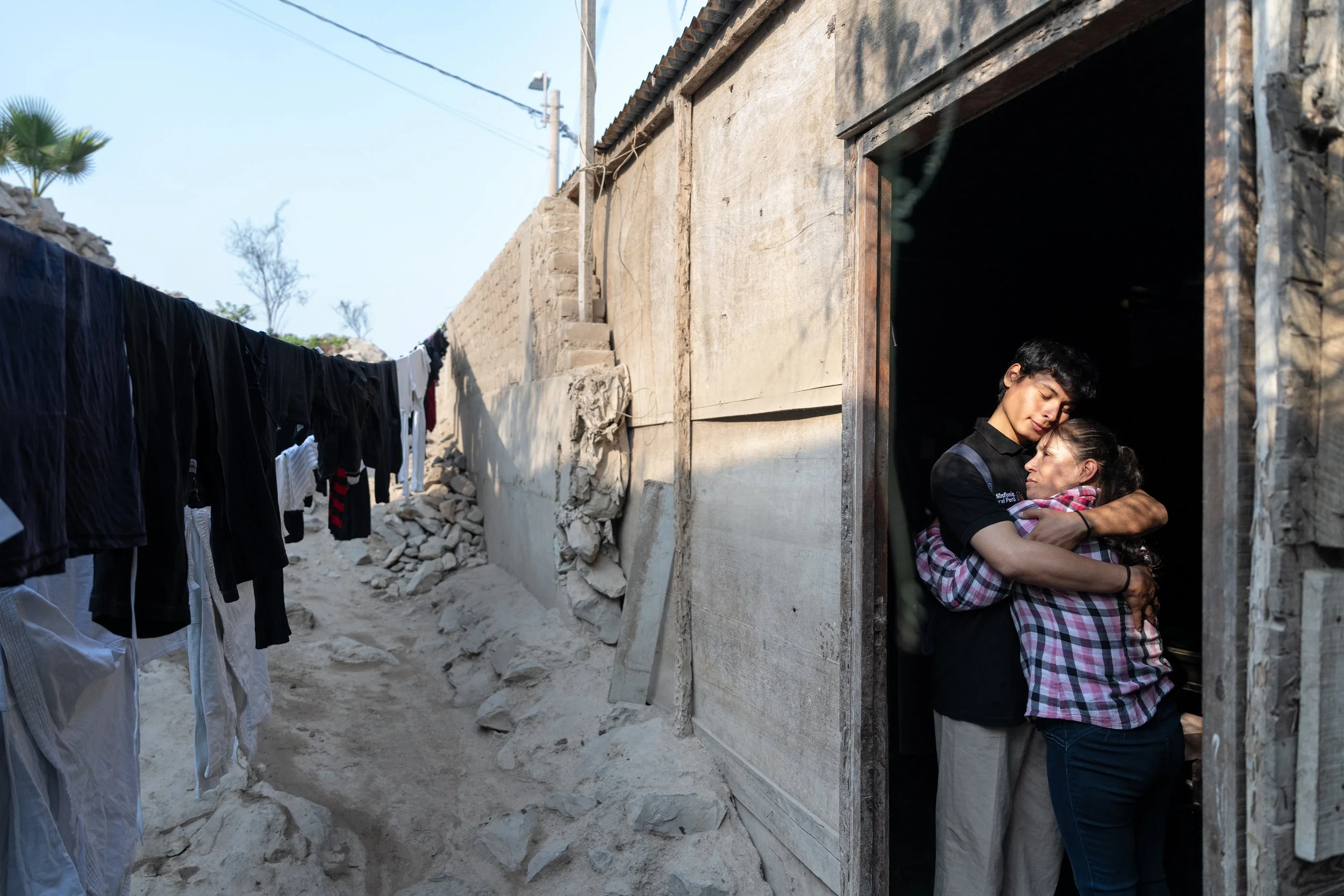The Rhythm of a New Life in Manchay
At just 17, Kelvin juggles many responsibilities: he sells newspapers, plays in a mariachi band, attends school, and studies classical music through Sinfonía por el Perú. A Venezuelan migrant, Kelvin has found in music a path to a better future—one that begins in Manchay, among Lima’s most impoverished districts.
Every morning, Kelvin Alejandro wakes before dawn. He gets dressed, grabs a quick breakfast, and furiously pedals his bicycle through the neighborhood to collect and deliver bundles of newspapers. Later, he heads to school. Afternoons are filled with trumpet lessons and household chores. On weekends, he often performs in a Mariachi group. If he’s lucky, there’s still time for a quick game of basketball with his brother. His routine is demanding, but he never complains. “With the little I earn, I help my mom, and I’ve bought my own music stand and supplies,” he says.
Kelvin's journey to Manchay began years ago in Venezuela, where the worsening economic crisis left his family unable even to afford three meals a day. Forced to migrate, they crossed borders and moved from place to place until the COVID-19 pandemic brought them to this arid settlement on the southern outskirts of Lima.
In Quechua, manchay means "fear"—a fitting name for a community born from the displacement of Peruvians fleeing political violence in the Andes during the 1980s. Today, the area remains marked by poverty, dusty streets, half-built homes, and limited access to basic services like clean water and sanitation.
It is amid these harsh conditions that Sinfonía por el Perú, the social music education initiative founded in 2011 by renowned tenor Juan Diego Flórez, has established a branch. The program aims to transform the lives of at-risk youth.
Memories of Venezuela
In his home country, Kelvin had been a member of a children's orchestra. His training ended when his family was forced to flee. Five years later, in Manchay, he found his way back to music through Sinfonía por el Perú. Inspired by his love for salsa, he chose the trumpet. Performing in Lima’s Manuel Segura Theater in front of his family, he was taken back to those carefree childhood days.
“In my community, there are many dangerous temptations,” Kelvin says. “Music helped me stay on track. When I’m playing, I feel calm, peaceful—as if all my problems disappear.”
For Kelvin, Sinfonía por el Perú became a space to overcome insecurity and imagine a better future. One milestone in that journey was his selection for Residencia Convivir - a national retreat supported by the Hilti Foundation, Sinfonía’s main partner in promoting music as a driver of social change. There, he met fellow young musicians from across the country, gaining confidence and a sense of belonging. Today, he shares his story to inspire others in his community.
His mother, Virginia Landó, firmly believes that if music education were part of the school curriculum, many more young people would find a way out of depression and street life. She feels that music is more than a hobby—it’s emotional care. Virginia should know, having always supported her son’s long hours spent with the Sinfonía por el Perú program.
“From a young age, Kelvin was disciplined. Now, even more so. I think that music has given him the confidence to be a better person […] The way they are taught, with respect, empathy, companionship, taking account of each one’s learning style. It has been really good for him.”
Music as a preventive strategy
As over a decade of studies show, youth in Manchay face serious challenges: gang involvement, gender-based violence, substance abuse, and early pregnancy are all persistent risks. A 2022 graduate thesis conducted in the area found that participation in Sinfonía por el Perú significantly contributed as a preventative strategy and support to families with at-risk teens.
“The emotional aspects and skills of the young people in Manchay were strengthened, not only through music education, but also thanks to the teamwork and collaboration promoted by the project [...] The development of these abilities [empathy and solidarity] allowed the youth to begin thinking about their future and life plans,” the study states.
Gabriela Perona, the program’s Executive Director, says the organization specifically targets neighborhoods where families have the greatest social and economic needs. The comprehensive training it provides has seen students become the first in their families to attend and finish university. “Most of our graduates are working, studying, volunteering—they want to take on the world.”
Before joining the program, Kelvin didn’t believe he had the talent for a professional music career. “I thought I’d have to study something just for the money, not because I liked it. But during the program, they told me I had potential.” Today, he dreams of becoming a professional trumpeter—and eventually, a teacher. “I want to show other kids that through music, you can achieve new things, become a better person, and give back to your community. Music can change your life.”
From the Hilti Foundation’s perspective, this idea of “becoming a better person” isn’t about changing who young people are — it’s about unlocking the potential that already exists within them. We believe that with the right support, every individual can discover their strengths and grow with confidence.
Kelvin’s story is that of a migrant leveraging the support of family and teachers to forge a new future for himself and Manchay.




